Since it represents states, not people, the Senate is undemocratic enough as is. As it is wielded today, the filibuster makes it even worse, further exaggerating the outsized power of a few senators who represent only a slim slice of the American electorate.
The Senate exerts near-total control over American lawmaking
US senators make or break progress for proposed legislation. Lots of bills pass the House only to die in the Senate. In fact, Senate legislation overrides House-passed legislation totally or partially 82 percent of the time. The Senate has the final say on treaties and federal court nominations too, including the Supreme Court.
US senators from smaller, whiter states hold excessive power
One might think that such a powerful body would be democratic, that its power would flow from the people. Not so. By design, the Senate represents states, not people, with the result that it grants people in small states more power than their counterparts in big states. In fact, since every state gets two senators no matter how many people live there, it works out that half of the US population has only 18 senators representing them, while 52 senators from the 26 smaller states stand for just 18 percent of Americans.
And, since the populations of smaller states tend to be overwhelmingly white (compared to larger, growing states where the electorate is more likely to be racially and ethnically diverse), white Americans have, on average, nearly twice as much representation in the Senate as Black and Hispanic Americans. Of the ten smallest states, seven are also in the top ten whitest.
The filibuster allows the minority to routinely obstruct the will of the majority, derailing even the most popular bills
The Senate’s design already gives outsize voice to a tiny minority of Americans. The filibuster makes it even worse. By effectively requiring a supermajority—or at least 60 votes—instead of just 51, this procedural relic has become a kill switch for even the most popular legislation, further narrowing who gets to decide what the country can or can’t do. What a majority—or even a supermajority—of voters want no longer matters; the filibuster allows a minority of senators representing only one in five US voters to call the shots for everyone else. That’s right, senators for 20 percent of the population can control what is possible for all of us.
Apologists plead that the filibuster promotes bipartisanship. If only that were true. In contrast, it incentivizes the minority party to obstruct. When the majority party has a credible threat of passing something, it is in the minority’s interest to come to the table and help shape the thing before it becomes law. But nothing has a credible threat of winning a supermajority in the Senate, so the minority is better off creating gridlock than participating in a win for the majority. The filibuster gives the minority the power—and political incentive—to kill even proposals with broad support across party lines, and bills that passed with bi-partisan support in the House.
Over and over again, 41 senators representing only 21 percent of Americans can deploy the filibuster to block progress, and even prevent a vote. Take these policy proposals that don’t stand a chance against the threat of a filibuster despite strong popular support:
Half of the US population has only 18 senators representing them, but 52 senators from the 26 smaller states stand for just 18 percent of American

- 65 percent of US voters say gun laws should be stricter.
- 61 percent of US voters say the Senate should pass the increased background check bills already passed by the House, including 55 percent of gun owners.
- 74 percent of all voters support the George Floyd Justice in Policing Act, including 88 percent of Democrats, 78 percent of Independents, and 55 percent of Republicans.
- Over half of US voters support cancelling student loan debt. Eighty-five percent of US voters, including 76 percent of Republicans, support cancelling student loan debt up to $20,000 per person.
- 68 percent of US voters support an ultra-millionaire wealth tax proposal, including 81 percent of Democrats, 66 percent of Independents, and 57 percent of Republicans.
- 66 percent of US voters support the Green New Deal to curb climate pollution and invest in jobs and infrastructure.
- At least 67 percent of US voters support HR1, the For the People Act to protect voting rights, including 56 percent of Republicans, 68 percent of Independents, and 77 percent of Democrats.
41 senators representing only 21 percent of Americans can block all these solutions.
Usually, voters shouldn’t have to know every procedural rule the Senate employs. But with so many dire problems facing our country, and a moderate president with an ambitious agenda at the helm, we can’t stand by and let the filibuster render solutions dead in the water any longer. It’s time for voters to demand the Senate throw off its self-imposed shackles and become the functioning lawmaking body the Constitution envisioned.
We’ve created some graphics to draw attention to all the important and popular policies the filibuster can block, and the dire need for filibuster reform. Find a zip of social media visuals to share with your networks here.
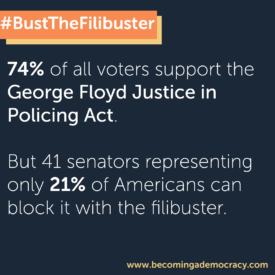 | 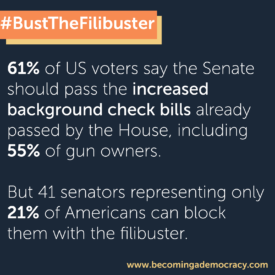 |
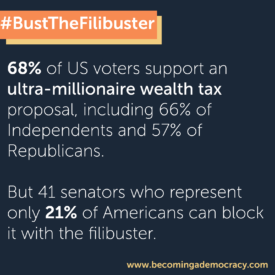 | 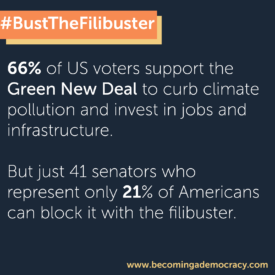 |
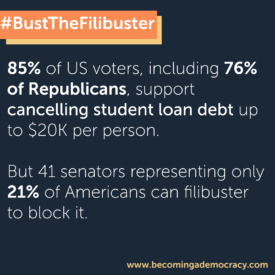 | 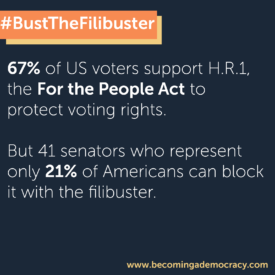 |
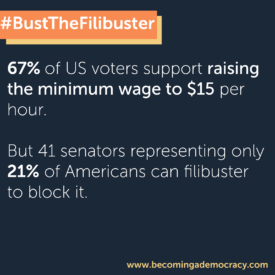 | 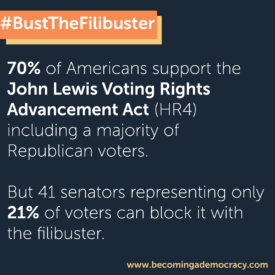 |
Sightline Institute is a 501(c)3 non-profit organization and does not support, endorse, or oppose any candidate or political party.
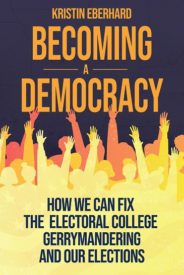 Kristin Eberhard, Director, Climate and Democracy and author of Becoming a Democracy: How We Can Fix the Electoral College, Gerrymandering, and Our Elections, is a researcher, writer, speaker, lawyer, and policy analyst who spearheads Sightline Institute’s work on democracy reform and on climate action. She researches, writes about, and speaks about elections systems and democracy reform, with particular expertise on Vote By Mail and proportional representation. Eberhard lives in Oregon, an all-Vote By Mail state. She is available to discuss tested, safe, fair COVID-19 election practices, state by state. Find all Eberhard’s latest research here.
Kristin Eberhard, Director, Climate and Democracy and author of Becoming a Democracy: How We Can Fix the Electoral College, Gerrymandering, and Our Elections, is a researcher, writer, speaker, lawyer, and policy analyst who spearheads Sightline Institute’s work on democracy reform and on climate action. She researches, writes about, and speaks about elections systems and democracy reform, with particular expertise on Vote By Mail and proportional representation. Eberhard lives in Oregon, an all-Vote By Mail state. She is available to discuss tested, safe, fair COVID-19 election practices, state by state. Find all Eberhard’s latest research here.
For press inquiries and interview requests, please contact Steph Routh.

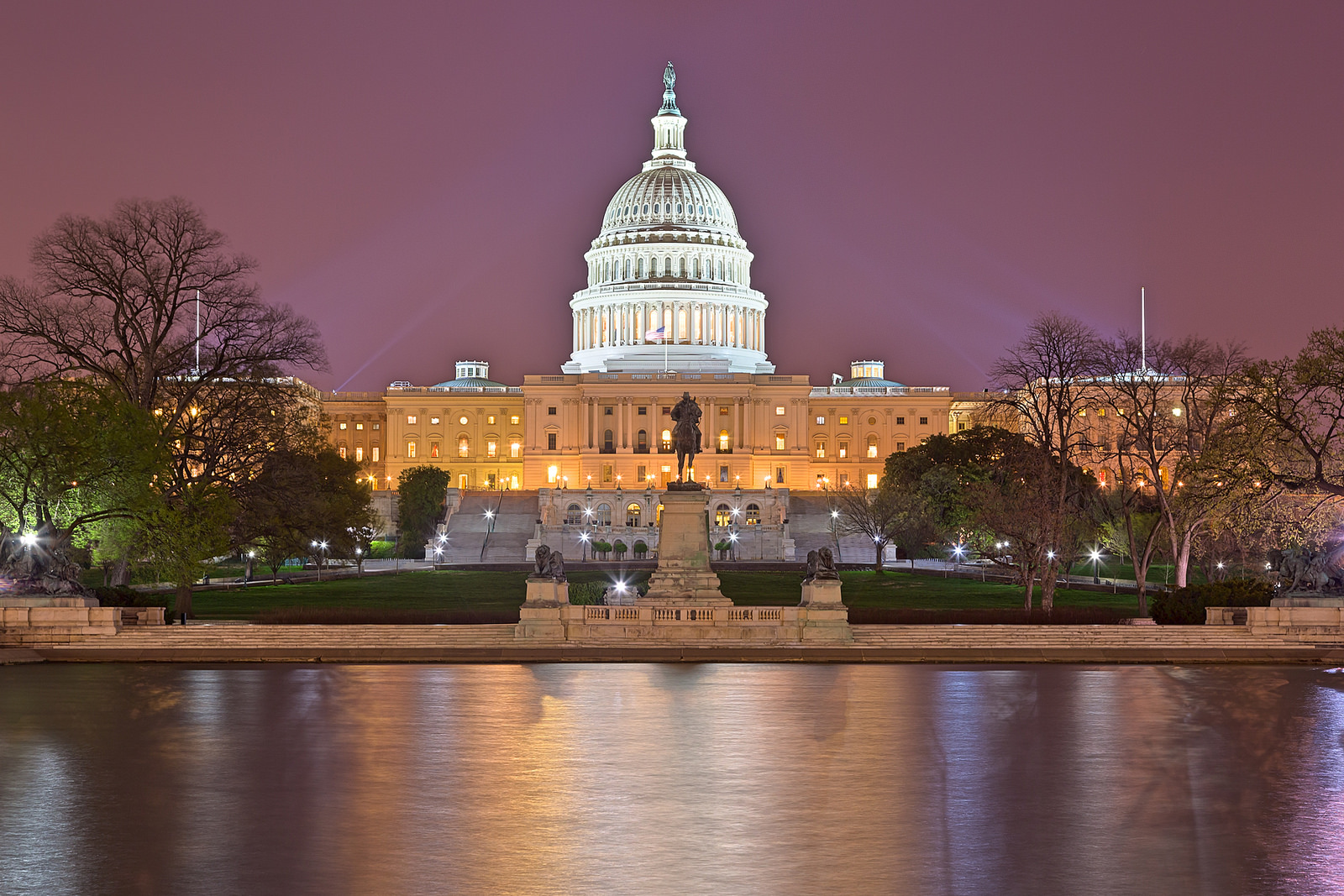
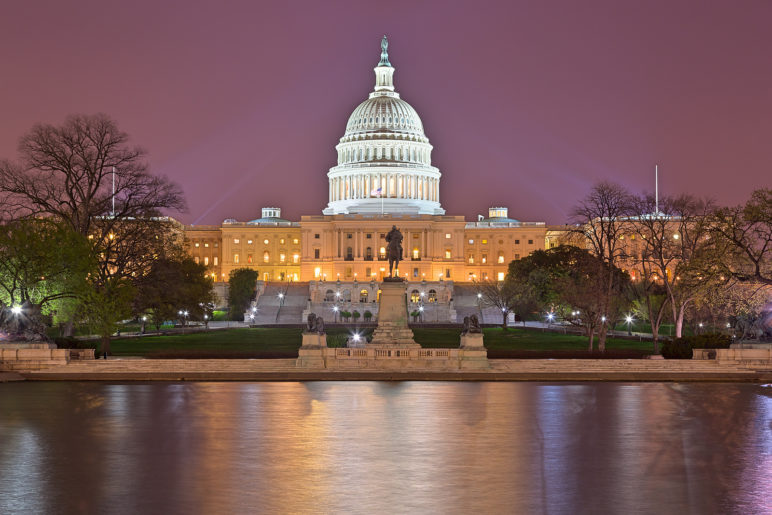








Alec
Manchin’s Op Ed left out the part where West Virginia ranked 50th in income, and consequently 47th in voter turnout in 2020? Like half the eligible voters in his state can’t or don’t make time to vote. It’s so poor. IIRC it was WV that was compared to Liberia, where many areas don’t have a working septic system. If Manchin doesn’t find 10 GOP Senators who support what he valued in S1, will he care? “I don’t give a ____ if I win reelection” Will he care if he loses? And what’s Sinema’s deal?
Ryan
The filibuster is terrible, but intra- party or coalition disagreement is the main problem.
I think as much, if not more, energy needs to be expended figuring out what it going to get 50+1 then convincing multiple Senators to change their longstanding views on this issue. Getting 85% of what we want is better than 0%.
Kristin Eberhard
Senators can get to 51 on many important issues. The filibuster means that’s not enough; they need to get to 60.
charlene andrade
so why doesn’t someone sue the policy to get it stopped?
John Whitmer
This piece on the filibuster is excellent, summarizing wonderfully what many of us are already all too aware of. How the filibuster is currently being misused and why it is a serious threat to a robust democracy and a functioning government needs to be continually repeated. The Sightline Institute – especially Kristin Eberhard – are working on issues of the highest importance. We are lucky for its, and her, efforts
kevin
Did you all know that Republicans wanted to remove the filibuster in the early years of Trumps Presidency? Now the tables have turned… and the Democrats want to remove the filibuster.
This is why we have the filibuster.
Lisa Cliff
This provides an excellent explanation of filibuster. I googled “What is a filibuster” and read three other articles, none came close to your explanation. Thank you so much for your thoughtful explanation.
Doug
I am shocked that 85% favor eliminating student debt! Where was this survey done at a university campus.
Kathleen Carmel
The filibuster keeps the communist leftists agenda from taking control so it’s very important!
Linda
This article explained the filibuster perfectly. I have never seen a country so screwed up and most of the citizens don’t even realize it.